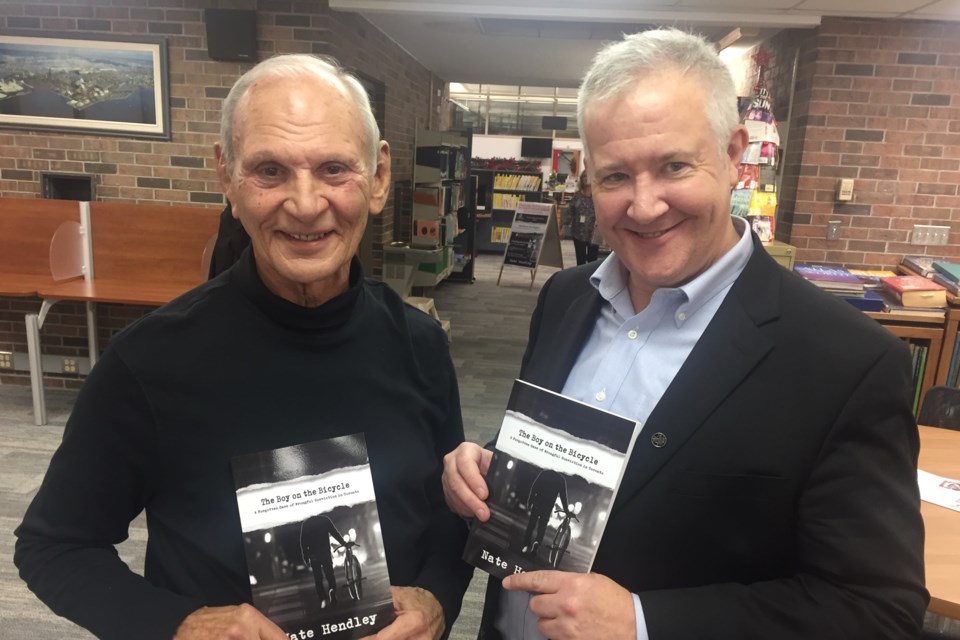SAULT STE. MARIE - Wrongfully convicted of murder at age 14, Ron Moffatt is calling for changes in the way children and teenagers are interrogated by police.
No young person should ever undergo a formal police interrogation alone, Moffatt told a packed weekend meeting at the James L. McIntyre Centennial Library.
"They shouldn’t ever be in that room without one of their guardians, a parent, whatever," said the Sault cartoonist, featured over the years in the Sault Star, Sault This Week and most recently on SooToday's Sunday Funny feature.
"First of all, the police have to realize who they’re dealing with. They’re dealing with a young offender who’s very nervous, scared to death," Moffatt said,
He also believes thought should be given to mandatory presence of a female police officer during interrogations.
"For some reason. I think that would be more comforting that way, for a woman to be in the room."
Sixty-two years ago, Moffatt spent almost eight months in custody after admitting during a police interrogation that he murdered a a seven-year-old boy on the Canadian National Exhibition grounds in Toronto.
"You happen to fit the description of the suspect they’re looking for," he said.
"Before you know it.... you’re being taken to an interrogation room where you’re handcuffed to the end of a desk to restrain you. Then you have two brawny detectives in your face questioning you."
"The same questions over and over and over again. Trying to break down your resistance or catch you in a lie. This goes on and on and on. It happened to me and I was 14 years old."
In 1950, threats of physical violence were also sometimes used against criminal suspects, Moffatt said.
He wasn't abused but definitely felt threatened by the demeanour of his interrogators.
Despite the seriousness of the crime, Moffatt's parents had no idea he was being interrogated by police.
"I wasn’t aware at the age of 14 that I had the right of legal representation. But after a while... you’ll do anything, say anything that they want to hear, to get them to stop badgering you and let you out of the room."
Because he was a juvenile at the time, Moffatt's name never appeared in newspaper accounts of the CNE murder.
Over the years, he was known in media reports only through pseudonyms including "Bob Smith" and "Ronald Mowatt."
For almost half a century, he's lived in Sault Ste. Marie, working as a caretaker for Algoma District School Board at William Merrifield V.C. Public School as well as Korah Collegiate, Sir James Dunn and Alexander Henry High School.
It took decades before Moffatt screwed up the courage to tell his wife and children about his past.
He was speaking this weekend at the launch of the first book about his wrongful conviction, The Boy on the Bicycle, by Nate Hendley, a veteran true-crime writer and former Ontario regional director with the Professional Writers Association of Canada.
"Some things unfortunately haven’t changed since Ron’s days," Hendley said.
"It’s still not mandatory for a parent or an adult or a lawyer to be present when young offenders are interrogated."
"By interrogation I mean an official interrogation In a cell in a police station. I’m not talking about talking to a teenager on the street who broke some windows."
"While a young offender can ask for a lawyer or a parent, it is not automatic. The interrogation can go on as long as the suspect doesn’t ask for a lawyer or a parent to be present."
False confessions are more common than most people think, Hendley said.
Moffatt's questioning, with no parent or lawyer present, with leading questions and threats, is almost a textbook case about how false confessions are generated, he added.
"To be fair, it’s understandable why police acted the way they did. They were under intense pressure to solve a terrible case and they had very little experience dealing with anything like it," Hendley said.
Moffatt believes cases involving confessions by young people should be heard only by juries.
The judge who decided his case "just had in his head off the bat, as far as I was concerned, that I was guilty and it didn’t matter about all the witnesses coming forward," Moffatt told the library gathering.
Moffatt's wife also spoke about her husband's decision to go public about his 62-year-old secret.
"When Ronnie first discussed with me about coming out in public, it was a terrifying decision because it could ostracize us to the public, our family, our friends. Then we talked a little more and he asked me one question."
Moffatt asked whether their grandaughter deserved to know the truth.
Being interviewed for the book was hard on her husband, she said.
"It was very hard, every question. He had to go down into the belly of the devil, and bring back and re-live all the horror."
The Boy on the Bicycle is a 230-page trade paperback available for $22.99 from Five Rivers Publishing Co., Amazon and iBooks.
